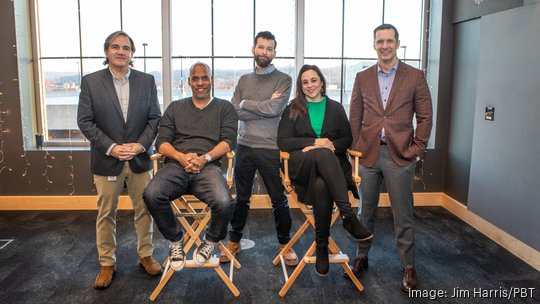
Local tech industry experts delved into the potential that artificial intelligence and robotics will have in the near future during a panel discussion at Google Pittsburgh's offices in Bakery Square, which focused on the "Future of AI in the Workplace" as part of an event hosted by the Pittsburgh Business Times.
Bill Moore, creative senior manager at Boston Consulting Group and the keynote speaker before the panel discussion took place, set the tone for the event by comparing AI's modern impact and the data that's powering it, like large language models, as being equal to that of prior transformative times and emphasized the pivotal role it'll likely serve in the years ahead.
"I believe that in the same way the steam engine powered the Industrial Revolution, these language engines are going to power a new kind of revolution and the next phase of the digital revolution in the Information Era," said Moore to a crowd of about 160 people. "To truly understand AI, you have to immerse yourself in the developer playground, which is easier to do than you might think."
When it comes to understanding the relationship between robots and AI, however, Pittsburgh Robotics Network Executive Director and panelist Jennifer Apicella said the two are "very different" but that ultimately they're both tools that can be tuned for practical business use. She said the industries that normally aren't considered to be "tech-forward" like manufacturing, are becoming increasingly emboldened by these tools and it's "quite vast" in terms of the types of industries that can adopt these technologies.
"We're talking about tools today," said Apicella. "It's incremental where you start but I would say almost any industry can start to apply it. We're probably going to see it evolve in things like health care and banking and things like that [initially] because of the vast nature of data and what they have to do with it."
At Highmark Health, one of many use cases where AI is being deployed is in the company's customer service department to bring new hires up to speed on the demands and nuances of the job quicker than before.
According to panelist Richard Clarke, who is the chief analytics officer at Highmark, the use of this technology for the initial onboarding process has been beneficial in what has historically been a portion of the company's workforce that has seen a greater turnover rate than others due to the high demands of the job.
"Giving them an AI assist is a game changer for that," said Clarke. "You can radically accelerate the time to proficiency and that could be in a number of different jobs and for the onboarding of a number of different roles."
For the robotics industry, the use of AI and complex datasets is translating to machines that can better operate beyond controlled environments. Matthew Johnson-Roberson, the director of Carnegie Mellon University's Robotics Institute and professor at CMU's School of Computer Science, said during the discussion that he's seeing this firsthand via his work and that of his students.
"We're moving into much more manipulation of objects than you may have seen before," said Johnson-Roberson. "Objects that are soft or flexible or translucent. There is a lot of focus on things like that."
Google of course is no stranger to deploying AI systems within its workforce or through its product offerings, but recent advancements with generative AI tools powered by large language models have "opened up" new avenues in sectors of its business like commerce, according to Michael Capsambelis, the director of product management & the community outreach lead at Google Pittsburgh.
The tech giant has been able to use AI to better suss out fraudsters or scam artists who might be selling false or misleading products on Google's platform, a feat that has grown to be increasingly difficult for humans to keep up with due to the scale at which Google's commerce reach has grown to over the years.
"One of the things we try to solve for with [Google] Shopping is understanding all of the products we have so [for example] if there are 10,000 people selling iPhones and they send us these details—and it varies quite a bit, we have to make sense of it all," said Capsambelis. "We want to help users find the best place to buy from and make sure you're getting the right product."









